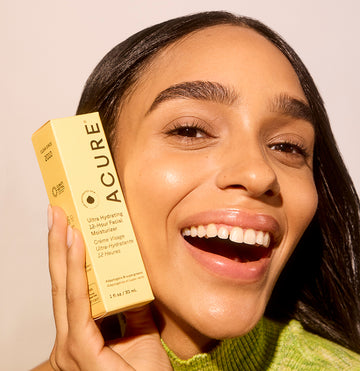Everyone knows Vitamin C, but what does it really do for your skin, and how can you incorporate it in your routine today.
Vitamin C is one of the most ubiquitous ingredients in skincare. From serums to moisturizers, this powerful antioxidant has become a staple in many skincare routines, and for good reason. While it's not a miracle ingredient, it offers many impressive benefits and helps support overall skin health. Incorporating Vitamine C into your routine can be an easy way to improve your skin’s overall radiance. In this guide, we’ll take a deep dive into Vitamin C, explaining what it is, the different forms it comes in, how it benefits your skin, and how you can start integrating it into your skincare regimen with Acure products.
What is Vitamin C?
Vitamin C, also known as ascorbic acid, is a water-soluble vitamin found in many fruits and vegetables, with citrus fruits being the most well-known sources. However, Vitamin C isn't just for boosting your immune system. It's a potent antioxidant that helps protect your skin from free radicals, the molecules that can damage your skin cells due to exposure to UV light, pollution, and other environmental factors. Vitamin C also plays a crucial role in collagen production, which helps maintain your skin’s elasticity and firmness.
What Are the Benefits of Including Vitamin C in My Skincare Routine?
Vitamin C is considered one of the most impactful ingredients for skincare, offering a variety of benefits that improve the skin’s overall health and appearance. Here’s why adding Vitamin C to your skincare routine is a smart move:
Brightens Skin
Vitamin C can help reduce dullness, giving your skin a radiant, glowing appearance. It helps brighten your complexion by inhibiting melanin production, which also reduces hyperpigmentation.
Evens Out Skin Tone
For those with dark spots, acne scars, or uneven skin tone, Vitamin C can help reduce these imperfections by inhibiting the enzyme responsible for pigment production.
Boosts Collagen Production
Collagen is a protein that provides structure to your skin, and Vitamin C is vital for its synthesis. By boosting collagen production, Vitamin C helps reduce fine lines, leading to a smoother, plumper look appearance..
Improves Skin Hydration
Though it's not a hydrating ingredient by itself, Vitamin C helps retain moisture by strengthening the skin’s barrier. This results in more hydrated, supple skin.
Fights Free Radical Damage
By neutralizing free radicals caused by sun exposure and pollution, Vitamin C protects the skin from oxidative stress and aids in reducing signs of premature aging.
What Are the Different Kinds of Vitamin C Used in Skincare?

Not all Vitamin C products are created equal. Different forms of Vitamin C are used in skincare formulations, each with its own benefits and potential drawbacks. Here are the most common types:
Ascorbic Acid (L-Ascorbic Acid)
This is pure Vitamin C and is the most potent form. It provides the best results but is also the least stable, meaning it can degrade quickly when exposed to air or light. Ascorbic acid is ideal for people looking for high-impact results but may be too strong for sensitive or reactive skin types.
Ascorbyl Palmitate
This is a more stable form of Vitamin C that penetrates deeper into the skin. It’s less potent than ascorbic acid but offers long-lasting benefits, making it suitable for sensitive skin.
Tetrahexyldecyl Ascorbate
A highly stable, oil-soluble version of Vitamin C. It’s great for those with dry or sensitive skin, as it causes less irritation while still providing excellent antioxidant protection and helps boost collagen production.
Magnesium Ascorbyl Phosphate
This water-soluble derivative of Vitamin C is gentle and less likely to irritate the skin, making it a great option for sensitive skin types. It works well in a variety of skincare formulations.
Sodium Ascorbyl Phosphate
Another water-soluble form, this version is stable and gentle, making it ideal for acne-prone and sensitive skin. It’s also known to help brighten the skin and reduce the appearance of dark spots.
Choosing the Right Vitamin C for My Skincare Routine
Selecting the right Vitamin C product depends on a few factors, including your skin type, skincare concerns, and personal preferences.
Skin Type
If you have sensitive or dry skin, you might want to avoid pure ascorbic acid, which can be too strong. Instead, opt for gentler forms like tetrahexyldecyl ascorbate. Those with normal or oily skin can benefit from the more potent ascorbic acid.
Skin Concerns
If you're dealing with hyperpigmentation or want to brighten your complexion, any form of Vitamin C can help. However, if you’re more focused on reducing fine lines and wrinkles, look for products that combine Vitamin C with other anti-aging ingredients.
Product Concentration
The potency of a Vitamin C product is measured by its concentration. Most serums contain between 10-20% Vitamin C. If you're new to Vitamin C or have sensitive skin, start with a lower concentration and work your way up.
How Does Vitamin C Interact With Other Skincare Ingredients?
Vitamin C works well with a number of other skincare ingredients, but it’s important to understand how they interact to get the best results. Here are some of the most common combinations:
Retinol
Both Vitamin C and retinol stimulate collagen production and can help reduce signs of aging. However, using them together can be irritating, so it’s best to introduce each one slowly into your routine and alternate between them.
Hyaluronic Acid
These two are a perfect pair. Hyaluronic acid boosts the hydrating effects of Vitamin C and improves absorption into the skin.
Niacinamide
Niacinamide reduces inflammation and can be used alongside Vitamin C to improve skin texture and even skin tone.
Salicylic Acid
Both ingredients help brighten and even out skin tone, but they can be irritating when used together. Avoid this combination.
Ferulic Acid
Vitamin C combined with ferulic acid can significantly enhance antioxidant protection and reduce free radical damage.
Adding Vitamin C to Your Skincare Routine

When adding any new product to your routine, always start slowly. Use the product every other day and gradually increase usage as your skin builds tolerance. This will help prevent any irritation or sensitivity. Incorporating Vitamin C in your skincare routine can be easy, whether you’re looking for a serum, moisturizer, or treatment product, we have you covered. A few of our favorite Vitamin C products include:





















